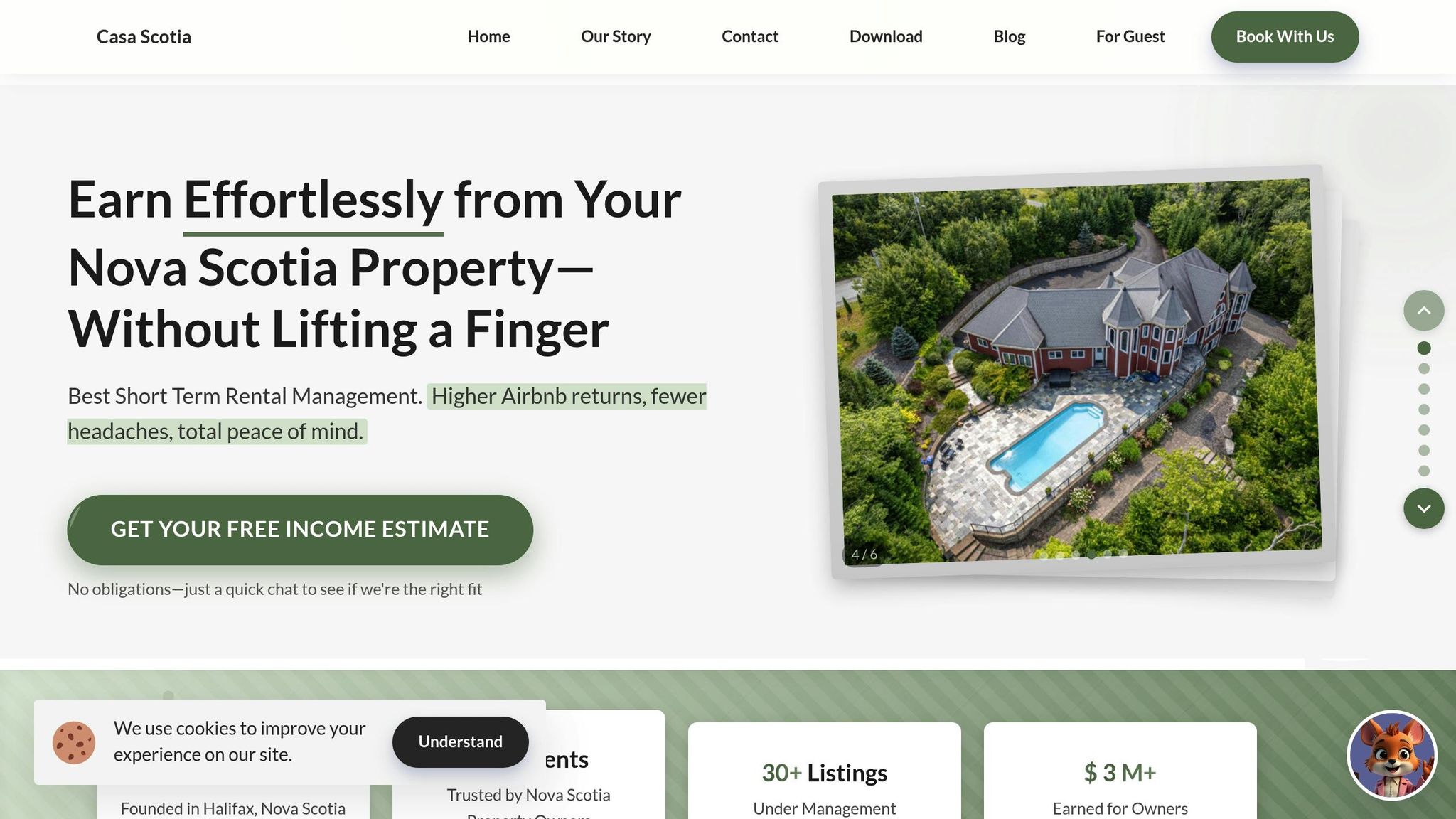If you’re considering running a short-term rental (STR) in Halifax Regional Municipality (HRM), understanding the rules is essential. Here’s what you need to know:
- Definition: STRs are residential properties rented for 28 days or less.
- Zoning: Rules depend on whether your property is in a residential, commercial, or rural zone.
- Residential STRs: Allowed in all residential zones if it’s your primary residence. Requires a $200 Zoning Confirmation Letter.
- Commercial STRs: Permitted in zones that allow tourist accommodations. Requires a $250 Development Only Permit.
- Permits and Fees: You’ll need municipal permits and annual provincial registration. Fees vary based on location and property type.
- Primary residence registration: $50/year.
- Commercial STRs: $240–$2,000/year, depending on the community tier.
- Compliance: Hosts must meet safety standards, display registration numbers, and maintain guest records.
Starting September 30, 2024, proof of compliance with municipal by-laws is mandatory for provincial registration. Missing deadlines or failing to comply can result in fines up to $100,000 annually.
Tip: Use HRM’s ExploreHRM tool to confirm your property’s zoning eligibility. Compliance might seem complex, but professional management services can simplify the process.
HRM Zoning Rules for STRs
Zoning rules in Halifax Regional Municipality (HRM) determine where short-term rentals (STRs) can legally operate. As of September 1, 2023, new regulations outline where STRs are permitted, depending on zoning classifications and whether the operator resides on the property.
STRs in Residential Zones
In residential zones, HRM allows two main types of STRs, each with its own set of rules.
Residential STRs apply when you rent out your primary residence, meaning you live in the same unit you’re offering as a rental. This excludes secondary or backyard suites. Entire home residential STRs are allowed in all zones where residential uses are permitted.
"STRs within a host's primary residence is permitted in all zones where residential uses are permitted (Residential STR)." [1]
Short-term bedroom rentals are another option, but they require the host to live on-site while renting out bedrooms. Most residential zones limit this to three bedrooms, though some zones allow up to six.
These residential requirements differ from those in commercial zones. Notably, residential STRs require a $200 Zoning Confirmation Letter to demonstrate compliance with by-laws, which is necessary for provincial registration.
STRs in Commercial and Tourist Zones
Commercial STRs operate under different rules. Unlike residential STRs, hosts don’t need to live on-site. This category includes properties like investment homes, seasonal cottages, secondary suites, and backyard suites.
"Within zones where hotels or other types of tourist accommodations were already permitted, commercial STRs are allowed." [1]
Commercial STRs are only permitted in zones that already allow tourist or commercial accommodations, such as hotels or motels. This ensures that transient rentals are concentrated in areas designed for tourism and short-term stays.
For commercial short-term bedroom rentals, there’s no requirement for the host to live on-site, and there’s no limit on the number of bedrooms that can be rented. This flexibility makes commercial zones appealing for those aiming to maximize income from larger properties.
All commercial STRs and short-term bedroom rentals (regardless of residential or commercial classification) require a Development Only Permit, which costs $250.
In rural areas, permissive mixed-use zoning or existing provisions allow for one commercial tourist accommodation per property. These arrangements remain under the new rules but may still require a permit.
How to Check Your Property's Zoning Eligibility
Before launching an STR, you’ll need to confirm your property’s zoning classification. HRM’s ExploreHRM mapping tool is an interactive online resource that provides details on land use, zoning designations, and plan areas for specific properties.
Once you’ve identified your zone using ExploreHRM, review the land use by-law for your plan area. These by-laws outline the permitted uses in your zone, including whether STRs are allowed and any restrictions that might apply.
If you’re uncertain about your property’s eligibility or need clarification on zoning requirements, you can contact 311 to speak with a municipal planner. This service is especially helpful for complex cases or when considering discretionary applications that might permit STRs in otherwise restricted zones.
Verifying your zoning is critical because, starting September 30, 2024, Nova Scotia’s provincial Short-term Rentals Registration Act will require proof of municipal by-law compliance. This proof can be provided through a Zoning Confirmation Letter or a Development Only Permit as part of the annual registration process. Next, you’ll learn how to navigate the permit registration process to finalize your compliance.
STR Permits and Registration in HRM
If you're planning to run a short-term rental (STR) in Halifax Regional Municipality (HRM), you'll need to navigate both municipal permits and provincial registration. Once you've confirmed your property's zoning, the next steps are securing the necessary permits and completing the registration process.
How to Register Your STR: Step-by-Step Process
Start by obtaining municipal proof of compliance, which is crucial for provincial registration. If you're operating a residential STR in your primary residence, you'll need a Zoning Confirmation Letter. For commercial STRs or short-term bedroom rentals, you'll require a Development Only Permit.
- Residential STRs: The Zoning Confirmation Letter ensures your property meets municipal by-laws and zoning regulations. The application process includes submitting property details and verifying that the unit being rented is your primary residence.
- Commercial STRs and short-term bedroom rentals: These require a Development Only Permit, which involves providing detailed information about the property and its intended use.
After securing the appropriate municipal permit, you'll need to register with the Provincial Tourist Accommodation Registry. This annual registration requires proof of municipal compliance. The provincial system categorizes STRs by location and type, with fees varying accordingly.
Additionally, there's a one-time registration requirement with the Municipal Residential Rental Registry. For primary residence STRs, this costs $10. For other types of STRs, the fee is included in the municipal permits.
Required Permits and Fees
The process involves several permits and fees, with municipal permits forming the foundation for provincial compliance. Here's a breakdown:
| Permit/Registration Type | Fee | Required For | Validity |
|---|---|---|---|
| Zoning Confirmation Letter (Municipal) | $200 | Residential STRs | Does not expire for renewals |
| Development Only Permit (Municipal) | $250 | Commercial STRs and short-term bedroom rentals | Does not expire; valid for renewals |
| Municipal Residential Rental Registry | $10 (Primary residence) | All STRs | One-time registration |
Provincial registration fees depend on the type and location of the STR:
- Primary residence STRs: $50 annually, making it an affordable option for homeowners renting out their own space.
- Commercial STRs: Fees are tiered by location:
- Tier 1 communities (e.g., Bedford, Dartmouth, Halifax): $2,000 annually.
- Tier 2 communities: $500 annually.
- Tier 3 communities (e.g., Digby, Lockeport, Shelburne): $240 annually.
- Traditional tourist accommodations: $50 annually for properties with 1–4 bedrooms, or $150 annually for those with 5+ bedrooms.
Application Deadlines and Renewal Requirements
Once you've completed the registration process, staying on top of deadlines is critical. The Short-term Rentals Registration Act came into effect on September 30, 2024, requiring all STRs to register with the province annually.
For the Municipal Residential Rental Registry, initial registration was required by April 1, 2024. This is a one-time process, so no renewals are necessary unless you're a new operator.
Provincial registration, however, must be renewed annually by April 1. Failure to renew on time can lead to fines of up to $100,000 per year [2][3][4]. Keep your permits and registrations current to avoid costly penalties.
STR Compliance and Enforcement in HRM
Running a short-term rental in Halifax Regional Municipality isn't just about getting the right permits and registrations. Staying compliant every single day is a crucial part of operating within the law. Here’s what that looks like in practice.
Once your permits are in place, the focus shifts to daily responsibilities. Hosts need to keep accurate guest records and consistently meet local safety and health requirements. By staying on top of these tasks, you’re not only creating a safe and welcoming space for your guests but also aligning with community standards and expectations.
sbb-itb-b5e1074
How Casa Scotia Helps STR Hosts in HRM

Casa Scotia makes managing short-term rentals in Halifax Regional Municipality (HRM) easier by handling operational challenges and ensuring your property runs smoothly. Balancing compliance with HRM's regulations while maximizing your rental income can be time-consuming and complex. Casa Scotia takes care of the regulatory details so you can focus on earning more from your property.
Complete STR Management and Compliance Support
Casa Scotia handles everything from zoning and permits to daily compliance tasks like tracking updates, recording guest details, and managing renewal deadlines. Their team keeps up with Halifax's changing short-term rental (STR) regulations, ensuring your property consistently meets municipal standards.
Using tools like ExploreHRM, Casa Scotia confirms zoning eligibility and helps you navigate specific requirements for your property. They also manage application deadlines, fee schedules, and any updates to local regulations, so you don’t have to.
Property Setup and Guest Services
Beyond compliance, Casa Scotia helps make your property stand out. They offer professional staging and photography to boost its appeal, along with dynamic pricing tools that adjust rates based on market trends, seasonal demand, and local events that draw visitors to Halifax.
Their services extend to guest screening, coordinating cleaning and maintenance, and marketing your property on platforms like Airbnb and Vrbo. This ensures your listing gets maximum visibility while attracting quality bookings. Casa Scotia’s in-depth knowledge of Halifax allows them to fine-tune listing descriptions and highlight amenities that appeal to tourists and business travellers alike.
Local Knowledge and Owner Reporting
Casa Scotia’s expertise in Halifax’s rental market gives them a clear understanding of local demand, seasonal trends, and pricing strategies that work best in different parts of HRM. For property owners unfamiliar with Halifax’s tourism cycles or business travel patterns, this insight can be a game-changer.
Through their owner portal, you can access real-time updates on bookings, property status, and financial performance. Detailed monthly reports provide a breakdown of earnings, occupancy rates, and expenses, giving you a transparent view of your property’s performance without needing to manage daily operations.
Casa Scotia also offers flexible management plans. Whether you need year-round management for steady income or peak-season support during Halifax’s busy summer months from May to September, they’ve got you covered. This allows property owners to enjoy personal use of their property while reaping the benefits of professional management during rental periods.
Summary: Operating STRs in HRM
Running a short-term rental (STR) in Halifax Regional Municipality (HRM) comes with a set of rules and regulations that you need to follow, including zoning requirements, obtaining the right permits, and staying compliant with local laws. These measures are in place to protect both property owners and the community, while ensuring your rental operates within legal boundaries. Professional management services can play a big role in simplifying these responsibilities.
Main Requirements: Zoning, Permits, and Compliance
To legally operate an STR in HRM, the first step is confirming your property’s zoning. Not all zones allow STRs, so this is a critical starting point. Once you’ve confirmed zoning, the next step is registering your rental and obtaining the necessary municipal and provincial permits. This involves submitting the required documents, paying fees, and meeting deadlines. Permits often need to be renewed periodically, so staying on top of renewal dates is important to avoid interruptions.
Beyond permits, daily compliance is key. This includes maintaining guest records, adhering to occupancy limits, meeting safety standards, and keeping up with any regulatory updates. HRM enforces these rules strictly, and failing to comply can result in fines or even the closure of your rental.
Benefits of Professional STR Management
Professional STR management services can take the hassle out of meeting these requirements. They handle everything from tracking permit deadlines to ensuring your property complies with local laws, including Nova Scotia's Residential Tenancies Act. For property owners who aren’t familiar with these regulations, having expert support can be incredibly helpful. By managing permits, safety standards, and legal obligations, professional teams not only reduce your workload but also help protect your investment from legal risks.
FAQs
How can I make sure my short-term rental in HRM meets all municipal and provincial regulations?
To keep your short-term rental (STR) in Halifax Regional Municipality (HRM) within the bounds of local and provincial regulations, the first step is to verify your property’s zoning classification. This will clarify whether STRs are permitted in your area. Depending on the zoning, you might need a Zoning Confirmation Letter or a Development Permit from HRM to ensure your property complies with local land use bylaws.
On top of that, starting 30 September 2024, the Nova Scotia government requires all STR operators to register annually under the Short-term Rentals Registration Act. This registration process involves submitting proof that your rental adheres to municipal rules. Following these steps will help you stay compliant and steer clear of fines or penalties.
How do zoning rules impact short-term rentals in mixed-use or rural areas of Halifax?
Zoning regulations in the Halifax Regional Municipality (HRM) are a key factor in determining where short-term rentals (STRs) are allowed. If your property is in a mixed-use zone, you’ll likely face fewer restrictions. These zones, often dedicated to commercial or tourism activities, usually don’t require the property to be your primary residence, making them a popular choice for STR operators.
For properties in rural areas, the rules tend to be more lenient. Generally, you can use one dwelling per lot as an STR, but it’s always a good idea to double-check for any specific conditions or exceptions that may apply to your particular location.
On the other hand, residential zones come with stricter regulations. STRs are often prohibited unless you have the proper permits in place. To stay on the right side of the law, it’s crucial to confirm your property’s zoning classification and understand the associated rules.
What happens if I miss the registration or compliance deadlines for short-term rentals in HRM?
Missing the deadlines for registration or compliance for short-term rentals in the Halifax Regional Municipality (HRM) can result in hefty fines. Property owners could be charged up to $1,000 per day, with penalties capped at $7,500.
To steer clear of these fines, make sure you adhere to all HRM registration and compliance deadlines. Keeping up with these requirements not only protects you from penalties but also ensures your rental business remains lawful and hassle-free.



